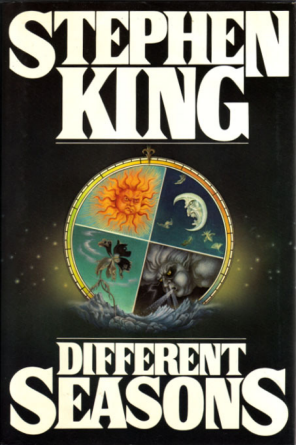By Taylor Johnson (The Cascade) – Email
Print Edition: November 14, 2012
 Recently a school in California, Rocklin High School, banned Stephen King’s novel Different Seasons. The novel contains a collection of four classic King novellas – Rita Hayworth and Shawshank Redemption, Apt Pupil, The Body and The Breathing Method.
Recently a school in California, Rocklin High School, banned Stephen King’s novel Different Seasons. The novel contains a collection of four classic King novellas – Rita Hayworth and Shawshank Redemption, Apt Pupil, The Body and The Breathing Method.
In an interview with CBS Sacramento, board members were questioned in regards to the book ban issue. Three of the four stories are not the responsible for the rising concern among parents and staff. Apt Pupil contains a graphic page-and-a-half rape scene, which the school committee decided was too much for students and pulled the book from shelves. Aside from Amanda Wong, the decision to ban the book was unanimous. In her interview with CBS Sacramento Wong stated, “I thought it was completely wrong of them to do that. I was really upset. Although I understand this parent’s concerns—I wouldn’t want my little brother reading this—I don’t believe it’s the school’s right to take the entire book out of [the] library just over that.”
To make matters even more controversial, Wong was the only member of the committee whom had actually read the book. Other committee members had not heard the entire story before deciding if the book should be banned or not. Wong stated her concern that by banning the novel, it will open the opportunity to ban other books. The issue was taken to the school board, and on Friday it was determined that the novel will remain in the library. Ultimately, it is up to the reader whether or not they want to read the novel.
Books and stories have for centuries been the way to pass down information and share experiences, and some experiences are horrible and highly controversial. However, what the reader takes from that story can be beneficial to their own lives. Growing up we heard stories like Hansel and Gretel which warned kids about strangers and wandering too far from home. In literature classes we analyze novels and texts in order to understand the social issues of the time.
Should we really be able to ban books? Are we banning the book because we are unable to handle the message it gives? Or, are we banning the book because we are sheltering students?
As an avid reader of all types of books, I feel that this is a violation of personal choice. As students, we are exposed to all kinds of real life controversial issues through books, news broadcasts and texts, some we analyze in class. Some issues are very graphic and horrific, however we do not ban them from the classroom.
King’s novel was banned because of a fictional rape; do we ban the news from classrooms for covering a real life rape? Real life issues are an important part of a students education. Being aware of what is happening in our world can better protect students and open their eyes to their surroundings. We cannot escape the horrible things that happen to people everyday but it’s easy to avoid reading a book; if you do not like what you are reading you have the opportunity to turn the page or find a new book. It’s the reader, not the school board, that should make the decision.


